
 |

|
|
|
Height: 6' 1½" (1,87 m) Weight: 178 lbs (80,7 kg) Eyes: blue Hair: brown Marriages: (1) Alice Mary Delbridge, actress (Dec 28. 1927 - Jun 29. 1931, divorced) daughter: Lynn 'McCrudden' Bellamy* (May 3. 1929 - Feb 25. 2009) (2) Catherine Livingston Willard, actress (Jul 6. 1931 - Aug 6. 1945, divorced), adopted son: Willard Bellamy* (ca. 1930 - bfr 1991), (3) Ethel Smith (Goldsmith), organist (Aug 21. 1945 - Nov 24/25. 1947, divorced) (4) Alice Murphy, talent agent (Nov 27. 1949 - Nov 29. 1991, his death) Siblings: Richard Edward (1906-1988) Bellamy (1910-1910) Lilla Carolyn Walbridge (1912-1997) |
|
Ralph Rexford Bellamy was born in Chicago, Cook County, Illinois on June 17. 1904 to Charles Rexford Bellamy and Lilla Louise Smith (born in Hamilton Ontario) as the eldest of three children. His father worked at the Barnes Crosby advertising agency. When he was young, he lived with his widowed maternal grandmother, father, mother, brother and sister. They lived in an apartment at 5709 Kimbark Avenue on Chicago's South side and moved from Chicago at the age of 5 to Wilmette, Linden Avenue, and then Forest Avenue. He was raised Baptist and was extremely close with his red-haired grandmother; and his first experience with death was the death of his 24 day old brother (1910) and then his grandmother. He received his first semi-acting class (which he would later term 'ham acting') from his Great Aunt Ella. |
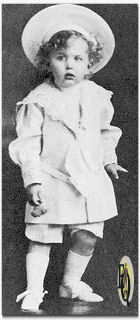 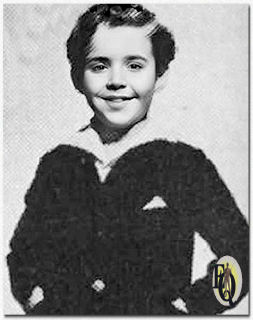 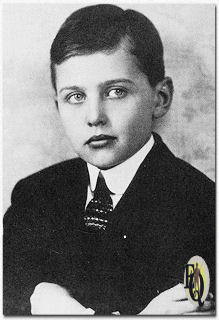 Above left: Ralph at age three. Above middle: young Ralph Bellamy. Above right: Graduating from Wilmette Grammar School. |
|
Early on Ralph was always playing "theatre". He loved every phase of it, often writing the play, coaching his playmates in their parts, and designing the costumes and attending to the make-up before the performance. Naturally he played the villain's role. When he was young, he
worked as a paper delivery boy, a grocery delivery boy (at Brinkman's
Grocery Store), an usher at movie theaters, and a soda jerk. At home he
raked and burnt leaves and beat rugs.
As a child he had shown a strong inclination for geology.
As a consequence, his parents had visions of him becoming a famous
geologist. Curiously enough, a play called Suppressed Desires was the first to be produced by Ralph when he organized a "little theatre" group of players on the North Side of Chicago when he was sixteen (1920). The high school dramatic company was named The North Shore Players** (1920 - 21). Also at 16 he wrote and produced a play called Nothing. “The utter futility of it was terribly dampening, considering his age. And I wouldn't be a bit surprised if some day Ralph left the stage and wrote plays instead.” his father attested once. He co-wrote the piece with another member of the North Shore Players Fenn Germer. |
|
One Saturday night, he went to Hamlet given by a stock company in the town near which he worked. He thought he recognized one of the players. After the show, a young man stepped up to him with a greeting. It was Nicholas Whitney, and he had played with John Gregory Adams. He played the role of Yorick.
The show soon did that which seems to be inevitable for all wandering stock companies. It went broke and disbanded. Bellamy found himself in Provo, Utah, with winter soon approaching. A chance meeting with a sheep herder in a pool room brought the next decision to him. He was told of a job packing sheep wool in the stockyards. He remained several weeks until a job which paid more money presented itself. A few weeks before spring came over the mountains another chance meeting came to Bellamy. (11) He met William 'Bill' Owen at a gathering of ardent stage enthusiasts (1921). Owen was a sterling Shakespearian actor. He took interest in Ralph and offered him the difficult leading role in Charles Rann Kennedy's The Servant in the House, which he was casting. Ralph played the role that well that when the show closed Billy Owen started coaching him for future roles. Like most juveniles Ralph played old men with funny beards. There he met Melvyn Douglas. Ralph stayed with Owen for a couple of seasons in the traveling troupe of Shakespearean players. He played Fleance in Macbeth and both Bassanio in The Merchant of Venice and the noble Moor with the pillow-complex in Othello. When the show reached Waukegan, forty miles from Chicago, young Bellamy decided to visit his parents. After being away for a year he was greeted with the same consternation as when he had confided to his parents that he wanted to become an actor. The father pleaded until next day for his son to give up acting. By dawn the boy consented. “My father was a struggling advertising man, who wound up with his own company with a partner. At one time they had Buick which was his biggest account but never a great success. A hard working, interesting fellow and well liked in his circles in Chicago.” Ralph was placed as an ad writer in his father's advertising firm. The fond parent soon had cause to regret his action. His son's mind was upon all things under the sun — except advertising. After a few weeks, to the mutual benefit of both, the son was fired. |
| He attended New Trier High School in Winnetka (Wilmette), Illinois. He was president of the Drama Club there. Soon after, he was forced to leave, just before graduation time in the spring of my fourth year (1922) when he was expelled for smoking on high school grounds. A few weeks later, he traded the North Shore Players** for another company... . |
|
Then Bellamy performed in stock and repertory theatres with the Chautauqua Road Company (1922), even under a tent. His very first major role touring in The Shepherd of the Hills (Jun 1922), an Ozark melodrama, had him playing two roles: the father of the lead (who was almost ten years Ralph's senior) and the villain. He continued to travel all through the Midwest, with stock companies (1922 - 23) in Madison, Wisconsin, and Fort Wayne and Evansville, Indiana. In each location he would stay for 10, 12, 15 weeks, or more, doing a different play every week. He rehearsed one play all day long while performing another at night. “It wasn't any bed of roses. Lots of times I went to bed hungry. And between engagements I worked at anything that offered three meals a day and a place to sleep. Even dug ditches several times, but I didn't mind. i was just marking time until I could get back to the job I liked best.” His friend Melvyn Douglas,
a student of Bill Owen, also a struggling young actor, had gotten a job as the
leading man in the Dorothy La Vern stock company (Orpheum Theatre Madison,
Wisconsin) and managed to get Bellamy on
as business and stage manager at $40 a week.
He returned to Madison a second time. In 1924 the Fisher's Players brought Scandal (Majestic Theater, Madison, WI) with Melvyn Douglas and Ralph Bellamy. At the close of that season Melvyn and Ralph went to different companies and didn't see each other for a while.
He left the Fisher Majestic Players to rejoin Dorothy La Vern Company
(Dec 1924 - Mar 1925).
On to Ishpeming, Michigan where in 1924
Bellamy became a member of a repertory troupe operated by the Beach and
Jones Repertoire Company. He was to be the carpenter, stage manager and
general business man. In 1924 - 1925 he seemed to try everything: he did Tab shows (tab being the diminutive of tabloid) for Fred Hurley's Jolly Follies opening in East Palestine, Ohio (1924), he tried black-face in McKeesport, Penn. in a song and dance act called Hope and Byrne, there is a contract dated June 14. 1924 with the Jackson Players, he played the lead with a stock company (1925 - 26) in Waterloo, Iowa. Ralph was the leading man when the Sherman stock company played in St. Jo(seph), Missouri So this is London (Lyceum, Feb 2. 1925). They remained with the company at least until Nov 8. 1925 when Ralph together with Violet Manning also performed Summer stock in Terre Haute, Indiana. Bellamy left Terre Haute when he was still leading man in the Sherman Stock company at the Hippodrome Theatre. Summer Stock opened at Shea's Opera house, Jamestown, New York on May 31. 1926 with Just Married, Nancy Duncan and Ralph Bellamy in the lead roles. This was part of a ten-week uneventful season as leading man in the Fiber and Shea Stock Company. |
| The Ralph Bellamy Players - Princess Theater |
|
Ralph had met Alice Delbridge when they were both playing in stock. She was nineteen, the ingénue in the company, and he was twenty-two. They were constantly together at the theater, and soon the love scenes they played behind the footlights became very real to them. “We fell head over heels in love. We didn't stop to consider that our tastes were not the same, nor that we seldom liked the same things or the same people.” On October 27. 1927 Bellamy failed to appear for the evening performance (heralded as his 500th consecutive performance). They thought they would return in time for the show, but their luck ran out somewhere. At Winterset being after hours for the court clerk they were unsuccessful to obtain a marriage license. At Knoxville it was the same. They then started for Indianola. According to different versions they either developed motor trouble or lost their way. As a result, 300 ticket holders received refunds for the evening show. They were married several months later (4) in St. Paul's Episcopal Church in Des Moines, Polk, Iowa on December 27. 1927. Applesauce (Apr 18. 1928) would be the Ralph Bellamy players farewell performance at the Princess theater. |
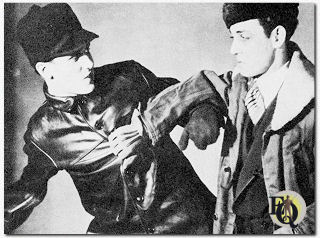 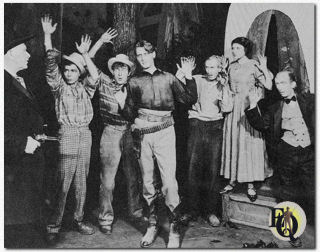 Two photos from When the smoke hit the fan Ralph's biography. Above left: Way Down East, Ralph Bellamy Players, Des Moines, 1928 with Charles A. Browne (R). (Note: The play was performed in Des Moines in Nov - Dec 1927) Above right: In a scene from Roadside, 1929, Plymouth Theatre, New York (Note: there is no confirmation of this date or theatre, 1930, Longacre Theatre seems more correct) |
|
He came to work in the Borscht Circuit in the Summer of 1928 as an assistant to Moss Hart. Each one of the big hotels catering to the Jewish population of New York had a large staff (musicians, dancers, actors,...) whose main duty was to keep the guests in good humor. In the weekend they'd do plays, musicals and vaudeville. Once again he was on the road with a stock company. It went broke and disbanded in Florida. It was in a small town at the edge of the Everglades, where everybody was selling real estate. Bellamy went to work on the thousands of Middle Westerners who were scrambling for Florida land. His profits — on paper — amounted to seventy thousand dollars. The young man dreamed of his own theatre, and his own servants. All Florida real estate men were wealthy on paper, and Bellamy had at last come into his own. (11) When the crash (Oct 1929) came Ralph was already back in New York. There he first spent, in early Summer, 6 weeks with a stock
company in Freeport, Long Island at $50 a week while he and Melvyn Douglas haunted the
offices of Broadway agents. Melvyn stayed with his parents and offered Ralph
lodgings. Finally, Bellamy won a part in Town Boy
(Belmont Theatre, Oct 4. - 31. 1929) on Broadway. It
closed after two performances. |
| The Kondolf-Folmer company - Lyceum Theater |
|
There Ralph first met actress Catherine Willard when he starred in George Cukor's stock company*** in the play Romance (Lyceum, June 19. 1930) in Rochester. Both were married to others. When this Kondolf-Folmer company opened in April 1930 in Rochester it was announced that Catherine Willard, "a favorite of other seasons" would be back later in the season. Ralph played the male lead in the majority of the productions. The company played at the Lyceum (or RKO Palace) in Rochester. 1930 program at the
Lyceum (weeks starting with): Ralph and Catharine were close friends by the time the company disbanded. Shortly after the season ended Ralph confided to his Rochester friends he was seeking a divorce. |
| New York |
|
In New York as soon as he was able, he had sent for his wife. However, even the birth of their daughter (circa 1929) couldn't erase the knowledge that their marriage was a failure. For the baby's sake, they tried to make the best of it for another year. The curtain fell on his first marriage in 1931. “Then, without any hard feelings on either side, we separated,” Bellamy said. In her divorce petition, however, Delbridge charged cruelty and non-support. She stated that she and Bellamy had been separated since 1930 (4) in Des Moines, Polk, Iowa. Returning to New York City in August 1930, practically broke, he found a nicely decorated basement room in a cold-water flat on West Eleventh Street near the river in Greenwich Village. He thought he was ready for Broadway. Apparently he wasn't. Things got so bad he was down to living on peanuts and water. He recalled in his book that a policeman once saw him stealing a bottle of milk from a doorstep, but turned away out of apparent pity.(5) “Once I was stranded in New York.
Hadn't eaten for four days. I heard of job about twenty-two block from my
rooming house. No money for car fare. So I hiked it - both ways. By the time
I reached the place, somebody else had been hired, so there was nothing to
do but turn around and go home. After 5 days of starvation, a Chicago agent offered his a place in a stock company and wired him the money he needed. In fact Chamberlain Brown asked him to see Arthur Hopkins a brilliant and successful Broadway producer about a part in Roadside. He went to see him in August and got the part. His appearance in the Broadway play Roadside (Longacre Theatre, Sep 26 - Oct 4. 1930) would proof to be a turning point in his career. On the opening night of the latter the audience greeted his most poignant lines with outbursts of applause. His work in that play was acclaimed one of the five best performances of the 1930 - 1931 season and led to his Hollywood contract. |
| Hollywood |
|
He received four contract offers and signed with United Artists. “When I
finally set out, I was on my way to Hollywood under contract to Joe Schenck.
On the way, I stopped in Chicago to say hello to an old friend from New
York, Frank Morgan. He really let me have it for going to Hollywood,
criticizing me from the perspective of a legitimate theater actor. In those
days, many stage actors looked down on Hollywood, especially silent films,
and Frank was no exception. He called me every name in the book—even a 'prostitute'—and
told me I was wasting my talent. Still, despite his harsh words, he came
down to the train station to see me off. My first impression of Hollywood was unforgettable. It was December 1930, but it was hot. I remember stepping out onto Hollywood Boulevard, where crowds had gathered along the sidewalks, waiting for a parade. Eventually, it arrived. Leading the procession were four stuffed reindeer on floats, followed by a sleigh on another float carrying Santa Claus. Behind that was yet another float with a wind machine and a man throwing confetti into it, sending a flurry of artificial snow up Hollywood Boulevard. That was my first real taste of Hollywood Boulevard in action.” On his trip to California he had a drawing room, supplied by Schenck, but no money for meals. The salary from Roadside had paid his debt but left him broke again. Roadside's producer Arthur Hopkins discovered this and insisted on lending him money so he could arrive in Hollywood with some kind of dignity. Which he did on a Saturday in November 1930. But the head of UA, Joseph Schenck, never used him in a picture, choosing instead to lend him out to other studios -- first to MGM for his debut in the gangster film The Secret Six (MGM, Apr 11. 1931) where he played a baby-faced killer next to Wallace Beery, Jean Harlow, Clark Gable, Johnny Mack Brown, and Lewis Stone. |
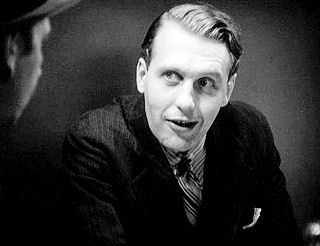
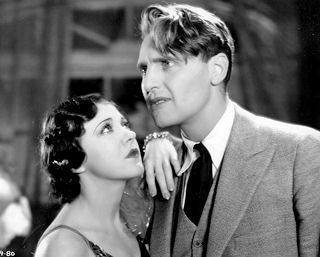 Above left: Ralph's debut in the gangster film The Secret Six (MGM, Apr 11. 1931) Above right: Ralph Bellamy and Ruth Chatterton in The Magnificent Lie (Paramount, Jul 25. 1931). |
|
After more than five months, it seemed that Hollywood was
not for him and he had packed everything to return to New York. By chance,
he met his friend Ruth Chatterton in the lobby of the Ambassador Hotel.
She wanted offered him to be her leading man in her next film The Magnificent Lie
(Paramount, Jul 25. 1931). Shortly after he arrived in Hollywood, his divorce papers came through. He had finished The Magnificent Lie (Paramount, Jul 25. 1931) one night and found actress Catherine Willard waiting outside the studio to drive him home. She had arrived with her mother for a vacation. “Well, the pictures done,” said Ralph, getting in behind the wheel. “Now we can drive up to Reno tomorrow and get married.” That was the proposal! Having made up their minds to get married, they didn't wait. In Nevada you can get a license and be married in ten minutes. So shortly after his divorce he was married (Jul 6. 1931) in Reno to the actress Catharine Willard. Forbidden (Columbia, Jan 8. 1932), with Barbara Stanwyck and Adolph Menjou was regarded by Bellamy as his first really good movie part. “One of my biggest professional mistakes was not being more selective after that.” (5) |
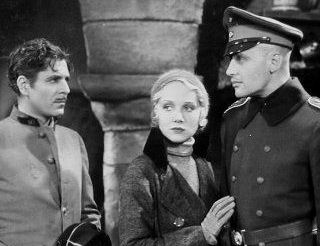
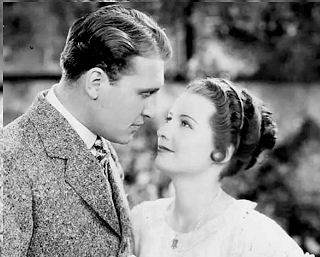 Above left: In Surrender (Fox, Dec 6. 1931) we see Ralph as Capt. Ebbing opposite Warner Baxter & Leila Hyams. Above right: In Forbidden (Columbia, Jan 8. 1932) Ralph Bellamy plays Daily Record city editor Al Holland opposite Barbara Stanwyck. |
|
He lived at 6657 Emmet Terrace, Hollywood (1932).
On October 3. 1932 a newspaper reported “Mrs. Ralph Bellamy recuperating at
the Cedars of Lebanon” (A hospital located at 4833
Fountain Avenue L.A.). In 1933, he became a founding director of the Screen Actors Guild and throughout his career was active in organizations designed to help actors.(5) He starred in numerous whodunits, first as Inspector Trent (in four 1933 - 34 programmers) beginning with Before Midnight (Columbia, Nov 18. 1933) and then as super-sleuth Ellery Queen (in four "terrible" 1940 - 41 B's beginning with Ellery Queen, Master Detective) (Columbia, Nov 26. 1940). Bellamy had high hopes for the Ellery Queen series co-starring Margaret Lindsay. “We had the writers on the set but the product was very ordinary indeed. I withdrew because they were shot too fast and Bill Gargan took over for awhile.” |
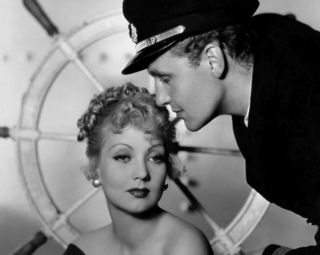
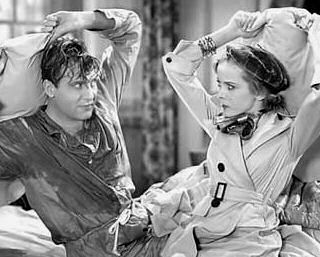 Above left: Ann Sothern & Ralph Bellamy in Eighth Bells (Columbia, Apr 11. 1935) Above right: In Let's get Married (Columbia, Mar 25. 1937) Ralph Bellamy plays the diligent chief weatherman who falls in love with the daughter (Ida Lupino) of a wealthy politician (Walter Connolly). |
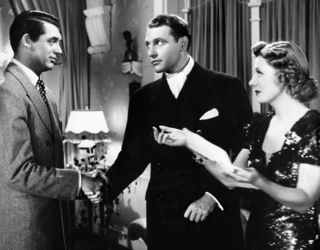
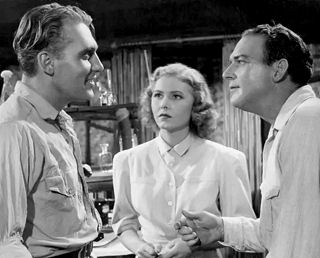 Above left: Cary Grant's rival for Irene Dunne in The Awful Truth (Columbia, Oct 20. 1937). Above right: In Crime of Dr. Hallet (Universal, Mar 11. 1938) two future Ellery Queens played opposite each other. Ralph Bellamy (L) in an argument with William Gargan (R). Josephine Hutchinson looks on. |
|
Besides a fifty-two acre farm near Salem, Connecticut, Ralph and
Catharine had both their Beverly Home (609 North Canon Drive,
Beverly Hills) and a place at Palm Springs with Ralph
wanting to buy a ranch, somewhere between Santa Fe and Albuquerque
(1936). With Charlie Farrell he purchased half a hundred desert acres in Palm Springs in 1936. They decided to erect a tennis court and charged admission. They quickly had to expand. The venture has become the famous Racquet Club. Ralph sold his share to Charlie in 1938. He earned an Oscar nomination as Cary Grant's rival for Irene Dunne in The Awful Truth (Columbia, Oct 20. 1937), with the film shot in six weeks with a minor script (above left). The film itself was most improvisations. Ralph parodied himself in the brilliant comedy His Girl Friday (Columbia, Jan 18. 1940). |

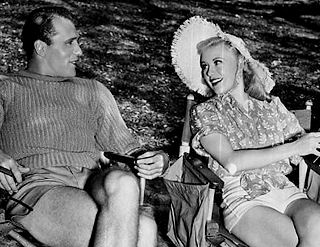
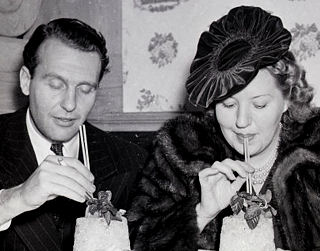 Above left: Ralph with Ginger Rogers on the set of Carefree (RKO Radio Pictures, Aug 25. 1938). Above right: Ralph Bellamy drinking Mint Juleps with his wife Catherine Willard (1939). |
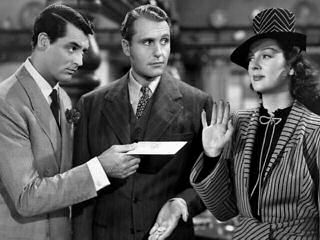 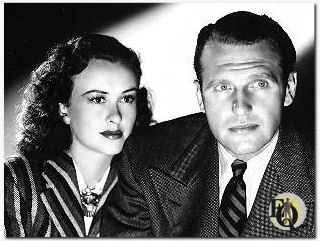 Above left: Ralph parodied himself in the brilliant comedy His Girl Friday (Columbia, Jan 18. 1940) - Click on the photo for a soundbit!... Above right: Ellery Queen and the Perfect Crime (Columbia, Aug 7. 1941). This is probably the best of the Columbia Queens. |
|
In 1942, he spotted a script on a producer's desk which had scribbled the description of the casting for a particular part, “Wealthy oilman from Southwest - able, but simple and naive. Typical Ralph Bellamy part.” He immediately took his leave of Hollywood and its typecasting of him, knowing it was no more than a job. He took his risks, however, being at the height of a lucrative career for Broadway. As luck would have it, he had a string of stage and television successes that he would value more than any of his early films, along with the occasional film. In 1943, he played an antifascist professor in a Broadway melodrama written by James Gow and Arnaud d'Usseau, Tomorrow the World aka Tomorrow's World (Ethel Barrymore Theatre, Apr 14. 1943 - Jun 17. 1944). Ralph directed the unsuccessful Broadway play Pretty Little Parlor (National Theatre, Apr 17. - 22. 1944). During 1944, he appeared as guest star on 27 major coast-to-coast programs, a record for guest performers. The year before he recorded a Victor Red Seal Album of Walt Whitman's Leaves of Grass. In 1945, he played a lionized Presidential aspirant in Howard Lindsay and Russel Crouse's Pulitzer Prize winning comedy State of the Union (Hudson Theatre, Nov 14. 1945 - Sep 13. 1947), (incidentally, Spence would reprise the role in a film of the same name). August 6. 1945 Catherine Willard was granted a divorce on the basis of "extreme cruelty". August 21. 1945 Ralph married Ethel Smith in Harrison, N.Y and the couple lived in Ethel's Park Vendome apartment. In 1947 Bellamy walked out, stating that he had no intention of paying his wife alimony. Ethel charged abandonment and claimed that he drank heavily, that he was moody, and would lock himself in his room. The organist said her husband became jealous when at their parties she received most of the attention. Bellamy contended that she had advised him to be home fifteen minutes after his final curtain or he would find the door locked. (3) A 1947 newspaper reported that his wife had locked him out of their New York apartment September 25. 1946 and had refused to live with him since although he said he sough numerous reconciliations. Miss Smith denied desertion. The divorce was granted November 24/25. 1947. |
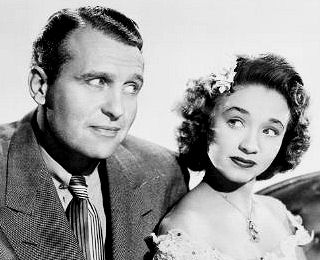
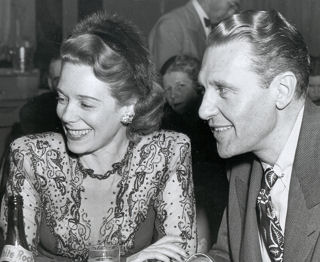 Above left: In Delightfully Dangerous (United Artists, Mar 31. 1945) Cheryl Williams, a 15-year-old (Jane Powell) is led to believe that her sister Josephine (Constance Moore) is a big Broadway star. In truth, Josephine is a stripper. Cheryl arrives in New York, figures out the truth, and tries to marry Josephine off to big-time Broadway producer Arthur Hale (Ralph Bellamy). Above right: Ralph Bellamy with his third wife Ethel Smith in New York (1946). |
|
Throughout the 1930s and '40s, Bellamy was regularly seen socially with a select circle of friends known affectionately as the "Irish Mafia," although they preferred the less sensational "Boy's Club." This group consisted of a group of Hollywood A-listers who were mainly of Irish descent (despite Bellamy having no Irish family connections himself). Others included James Cagney, Pat O'Brien, Spencer Tracy, Lynne Overman, Frank Morgan and Frank McHugh. (2) In 1948 he made his a television debut in the Philco Television Playhouse (NBC, Nov 7. 1948 - Jan 29. 1956, min. 4x). After divorcing his third wife and paying for continuing medical bills for his daughter, Bellamy had little finances when he was offered the part of Detective McLeod, an overzealous police officer, in Sidney Kingsley's drama Detective Story (Hudson Theatre, Mar 23. 1949 - Aug 12. 1950). |
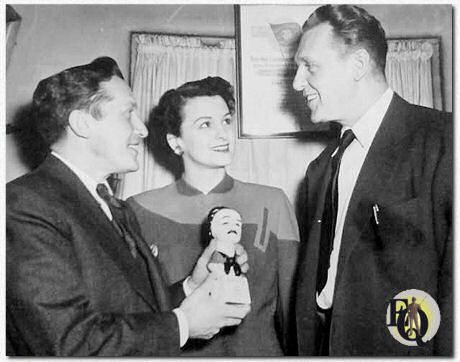 Above: Sidney Kingsley, author of Detective Story showing Lydia Clarke and Ralph Bellamy, leading actors in his play, the 'Edgar' which he received from the Mystery Writers of America for his authentic portrayal of detectives in his hit play at the Hudson Theater, NY. (Photographer Leo Friedman, thanks to Joseph Goodrich |
|
The play Detective Story was a hit and led to a role in the television series Man Against Crime (aka Follow that Man), which aired from 1949 to 1954. He played as a quick-fisted but otherwise well-liked detective Mike Barnett. The show was the first live weekly half-hour dramatic show on network television, and he won an Academy of Radio and Television Arts and Sciences Award for his performance on it. Alice Murphy was an executive in Ralph's agent's office when they first met in 1941. They saw each other at meetings and business lunches. It was about eight years before they had their first official social date. Ralph starred in the play. The day before Thanksgiving, he asked if she was going to her family's home in Connecticut for the vacation. Alice replied that she would stay in town to clean up her apartment. The next day he called her and invited her to a Thanksgiving dinner. They married exactly one year later on Thanksgiving November 27. 1949. The Bellamys were now
living in one of the first apartment buildings that were built in uptown
Manhattan around 1886, which was an ideal spot for Ralph's two hobbies. A cook
of distinction, he was given free run of the kitchen at Henri's Fifty-Second
Street restaurant. He also painted New York scenes and sold his first water
color at an Urban League competition. |
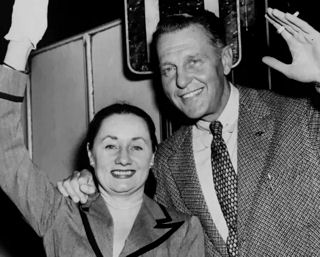
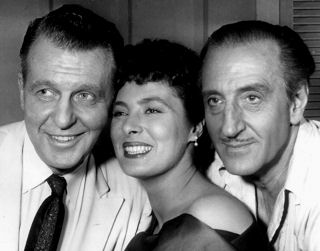 Above left: London: Actor Ralph Bellamy and his (4th) wife at Waterloo Station before they left on the Queen Mary boat train at the start of their return trip to their home in America (Aug 7. 1952). Above right: Ralph Bellamy, Rita Gam & Basil Rathbone "Affair In Sumatra" from the series Screen Directors Playhouse (ABC, Feb 22. 1956). |
| In 1958, he would play FDR in Dore Schary's Broadway play Sunrise at Campobello (Cort Theatre, Jan 30. 1958 - May 30. 1959) -- here Bellamy built his reputation as an actor by portraying Franklin Delano Roosevelt. By delving into the history of FDR the man and the politician, he came to an understanding of the personality and psyche of the character. He then spent weeks at a rehabilitation center learning how to manage braces, crutches, and a wheelchair, so that his portrayal of FDR, after he was stricken with polio, would be realistic and accurate. In preparing for the original part, he would consult at length with Eleanor Roosevelt and her children. He called Sunrise at Campobello the “highlight of my professional career.” It can be said that character acting was defined and perfected by Ralph Bellamy. He won the Tony and New York's Critics Circle Award as best actor in Sunrise at Campobello and starred in the subsequent film version in 1960. He would play FDR once again in the miniseries The Winds of War (ABC, 1983) and War and Remembrance (ABC, 1988 - 89). |
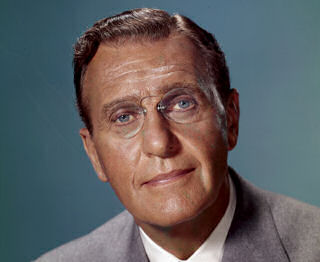
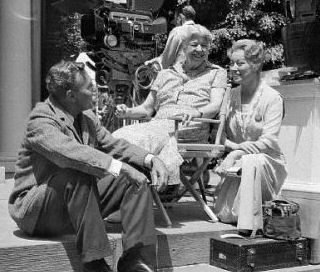 Above left: Ralph Bellamy as FDR in Sunrise At Campobello (Warner Bros., Sep 26. 1960) Above right: Ralph Bellamy, Eleanor Roosevelt, and Greer Garson (filming Sunrise at Campobello), Hyde Park, 1960. |
|
|
|
He played as a regular in many major
television series including The Eleventh Hour
(NBC, 1963 - 1964), The
Survivors (ABC, Sep 29. - Dec 22. 1969, min.
12 x), The Most Deadly Game
(ABC, Oct 10. 1970 - Jan 16. 1971, min. 13 x), and Hunter
(CBS, Feb 18. - May 27. 1977, min.12 x). He returned true to his roles as detective, villain, and other man in each of these series. It was in 1968 that Bellamy made a radical character shift by playing a diabolist in Rosemary's Baby (Paramount, Jun 12. 1968). |
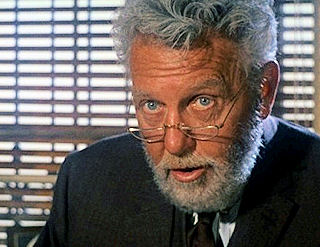
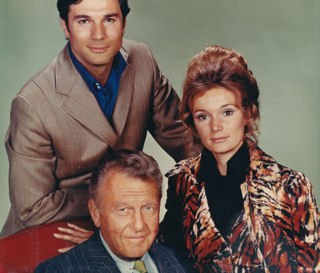 Above left: Bellamy playing a diabolist in Rosemary's Baby (Paramount, Jun 12. 1968). Above right: In The Most Deadly Game, an Aaron Spelling production,with George Maharis and Yvette Mimieux, Ralph Bellamy played Ethan Arcane one of three criminologists who took on high-profile cases (ABC, Oct 10. 1970 - Jan 16. 1971, min. 13 x). |
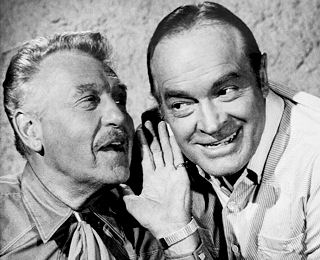
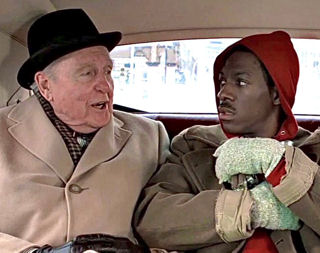 Above left: Ralph Bellamy (L), one of America's most respected and enduring actors, shown here with Bob Hope during the filming of Cancel My Reservation (1972), the new Warner Bros. release, a mystery comedy in which Bellamy portrays a land baron of the Soutwest. Above right: Billy Ray Valentine (Eddie Murphy) and Randolph Duke (Ralph Bellamy) in John Landis' Trading Places (Paramount, Jun 7. 1983). |
|
His autobiography, When the Smoke Hit the Fan, was published in 1979.
Director John Landis gave Bellamy's film career a big boost by casting him
in Trading Places (Paramount, Jun 7. 1983), as a ruthless Wall Street manipulator and
brother to Don Ameche. His most moving experience, professionally, was when he received his honorary Oscar in 1987, an award long overdue. “It was a remarkable experience. When I walked out and that entire audience stood up, I choked up. I had to wait a second to pull myself together. To see an entire, enormous audience stand up for you is something that's just unexplainable. It was unexpected and very much appreciated.” (15) We come to see him in several movies e.g. Amazon Women on the Moon (Universal, Sep 18. 1987), a cameo in Coming to America (Paramount, Jun 26. 1988) and of course a benevolent shipping magnate in the 1990 movie Pretty Woman (Buena Vista, Mar 23. 1990). |
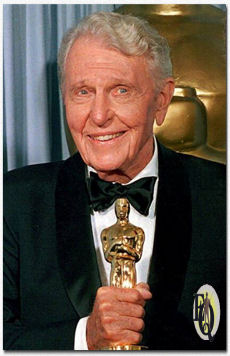 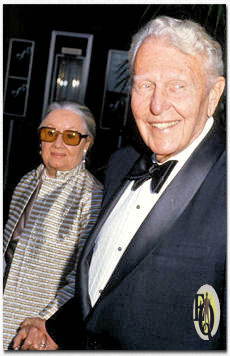 Above left and right: The 59th Academy Awards were held at the Dorothy Chandler Pavilion on March 30. 1987. Ralph arriving with his wife Alice received an honorary Oscar. |
|
|
| Bellamy was also one of the founding members of the Screen Actors Guild and a four-term president of Actors' Equity (between 1952 and 1964). Best remembered by his fellow actors as a champion of actors' rights. He doubled the equity's assets within six years and established the first actors' pension fund. Bellamy guided the Actors' Equity through the political blacklisting of the McCarthy era by forming a panel that established ground rules to protect members against unproved charges of Communist Party membership or sympathy. He also actively lobbied for the repeal of theatre admission taxes and for income averaging in computing taxes for performers. |
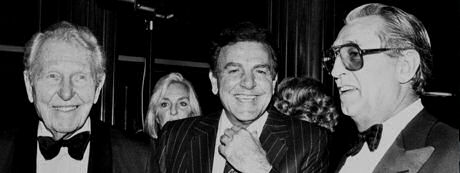 Above: Ralph Bellamy with Mike Conners and Robert Mitchum! |
|
Often a leading man, Bellamy achieved greater success in supporting roles as
"the other man". In a
career that spanned six decades on stage and screen, Bellamy played roles that
fell into three broad categories: 1) the rich, reliable, but dull figure who is
jilted by the leading lady, 2) the detective who always finds his prey, and 3)
the slightly sinister but stylish villain. Usually appearing in supporting
roles, Bellamy often said he never regarded himself as a leading man, so no one
else did either. “I would never think of retiring. To me, retirement is just waiting to die. There’s so much to do in life—so many books to read, places to go, things to experience, and ways to express yourself. I do a little painting, a little writing—not much, but something. You have to have something to occupy your time, to keep you engaged. Without that, you stagnate. You can see it in those who have chosen to let everything go, living off whatever benefits they have. It’s a shame—I hate to see it. To me, retirement is the beginning of disintegration. I could never do it. There’s always something new on the horizon—a trip, a voyage, a discovery. Whether it’s from the books you read or the people you meet, life continues to offer surprises as long as your mind and body stay active. I make sure to keep my body active too. Every morning, I do a few exercises to stay in shape. I’m getting up there in age—85 next month—but I’m not slowing down. I won’t use a cliché about what comes next, but I do look forward to whatever the future holds. I’ve made 105 feature films. While I had fun making many of them, and some turned out to be great, I wouldn’t say any of them fully captured what I envisioned for my career as an actor. I’m still hoping for that one defining role. And I know I’m not alone—most actors would probably say the same.” (SAG-AFTRA May 10. 1989)
On November 29. 1991 Bellamy died at St. John's Hospital and
Health Center in Los Angeles of a lung ailment at the age of 87 at 2:18 a.m.
He had been hospitalized earlier in the month for his long-standing lung
disease. |
|
Notes: For events prior to 1930, several articles and the author’s own biography (which is not structured chronologically) describe similar or semi-similar events. The timelines presented in these sources often differ. Where discrepancies exist, we have favored the facts and dates provided by the oldest sources. * Without naming her, in a 1934 article, Bellamy admitted to having a "secret" 5 year old daughter" with his first wife. There is no mention of a son in this article. We assume, given the name Willard Bellamy, that this is an adopted son with his second wife. ** While there are/were several groups going by that name (Chicago and Mass.), this group was working in Winnetka and reportedly still carries the Bellamy tradition. *** George Cukor was one of the co-founders of the C.F. and Z. Production Company (aka Kondolf-Folmer company, aka the Lyceum stock company) playing at the Lyceum in Rochester. The company was later renamed the Cukor-Kondolf Stock Company. **** Their second program was Grounds for Divorce (Princess Theatre, Sep 19. 1926). All dates for movies are for the first US release. All dates for TV programs are original first airdates. All dates for (radio) plays are for the time span the actor was involved. Facts in red still need confirmation. |
|
Click on Uncle Sam if you think you can help out...!
|
|
Other references
Additional video & audio sources |
|
This actor profile is a part of
Ellery Queen a website on deduction.
The actor above played Ellery Queen in
an Ellery Queen film series.
Click Uncle Sam if you think you can help
out...! Many of the profiles on this site have been compiled after very careful research of various sources. Please quote and cite ethically! |
|
Page first published before May 24. 2016 Version x2.4 - Last updated April 25. 2025 |
 b a c k
t o L i s t o f S u s p
e c t s
b a c k
t o L i s t o f S u s p
e c t s
|
|
| Introduction | Floor Plan | Q.B.I. |
List of Suspects | Whodunit? | Q.E.D. | Kill as directed | New | Copyright Copyright © MCMXCIX-MMXXV Ellery Queen, a website on deduction. All rights reserved. |